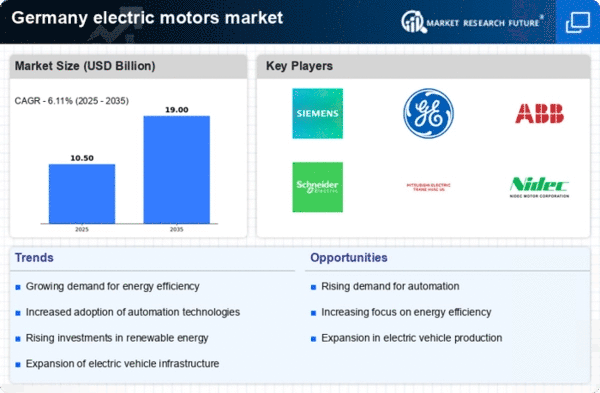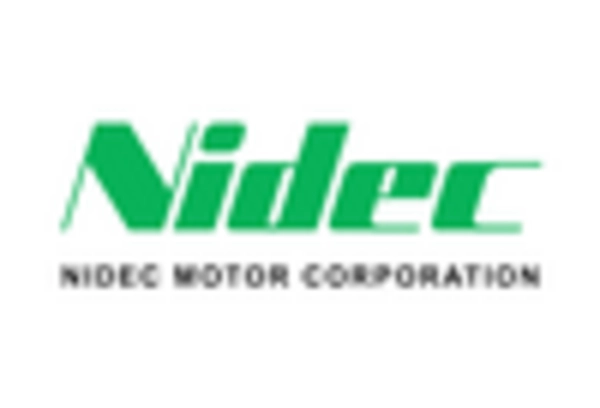Rising Industrial Automation
The electric motors market is experiencing a notable surge due to the increasing adoption of industrial automation across various sectors. As industries strive for enhanced productivity and efficiency, the demand for electric motors, which are integral to automated systems, is expected to rise. In 2025, the market is projected to grow by approximately 8% annually, driven by the need for precision and reliability in manufacturing processes. This trend is particularly evident in automotive and machinery sectors, where electric motors play a crucial role in driving equipment and machinery. The push towards automation not only enhances operational efficiency but also reduces labor costs, further propelling the electric motors market. As companies invest in advanced technologies, the demand for high-performance electric motors is likely to increase, solidifying their importance in the industrial landscape.
Growth in Electric Vehicle Production
The electric motors market is poised for growth due to the burgeoning electric vehicle (EV) production in Germany. With major automotive manufacturers investing heavily in EV technology, the demand for electric motors is expected to rise significantly. In 2025, the electric vehicle segment is projected to contribute approximately 25% to the overall electric motors market. This growth is driven by consumer preferences shifting towards sustainable transportation solutions, coupled with government policies promoting electric mobility. As the automotive industry adapts to these changes, the need for high-efficiency electric motors becomes paramount. Furthermore, advancements in battery technology and charging infrastructure are likely to enhance the appeal of electric vehicles, thereby further stimulating the electric motors market. The interplay between automotive innovation and electric motor technology is expected to shape the future landscape of transportation in Germany.
Increased Focus on Energy Regulations
The electric motors market is significantly influenced by stringent energy regulations aimed at improving energy efficiency. The government has implemented various policies that mandate the use of energy-efficient electric motors in industrial applications. By 2025, it is anticipated that compliance with these regulations could drive a 15% increase in the adoption of high-efficiency motors. This regulatory environment not only encourages manufacturers to innovate but also promotes the development of advanced motor technologies that meet or exceed efficiency standards. As industries adapt to these regulations, the demand for electric motors that comply with energy efficiency criteria is likely to rise. This focus on energy regulations not only supports environmental sustainability but also enhances the competitiveness of German industries in the global market.
Shift Towards Renewable Energy Sources
Germany's commitment to renewable energy sources significantly influences the electric motors market. The transition from fossil fuels to renewable energy, such as wind and solar, necessitates the use of electric motors in various applications, including energy generation and distribution. In 2025, it is estimated that the integration of electric motors in renewable energy systems could account for nearly 30% of the total market share. This shift not only supports Germany's environmental goals but also stimulates innovation in motor technology, leading to more efficient and sustainable solutions. The electric motors market is likely to benefit from government incentives aimed at promoting renewable energy, further enhancing the demand for electric motors in this sector. As the country continues to invest in green technologies, the role of electric motors becomes increasingly vital in achieving energy transition objectives.
Technological Innovations in Motor Manufacturing
Technological advancements in motor manufacturing are reshaping the electric motors market. Innovations such as the integration of smart technologies and IoT capabilities into electric motors are enhancing their performance and functionality. In 2025, it is expected that smart electric motors will account for a growing share of the market, driven by the demand for automation and data-driven decision-making in industries. These innovations not only improve operational efficiency but also enable predictive maintenance, reducing downtime and operational costs. As manufacturers continue to invest in research and development, the electric motors market is likely to witness the emergence of more sophisticated motor designs that cater to diverse applications. This trend towards technological innovation is expected to play a crucial role in the future growth of the electric motors market.
















